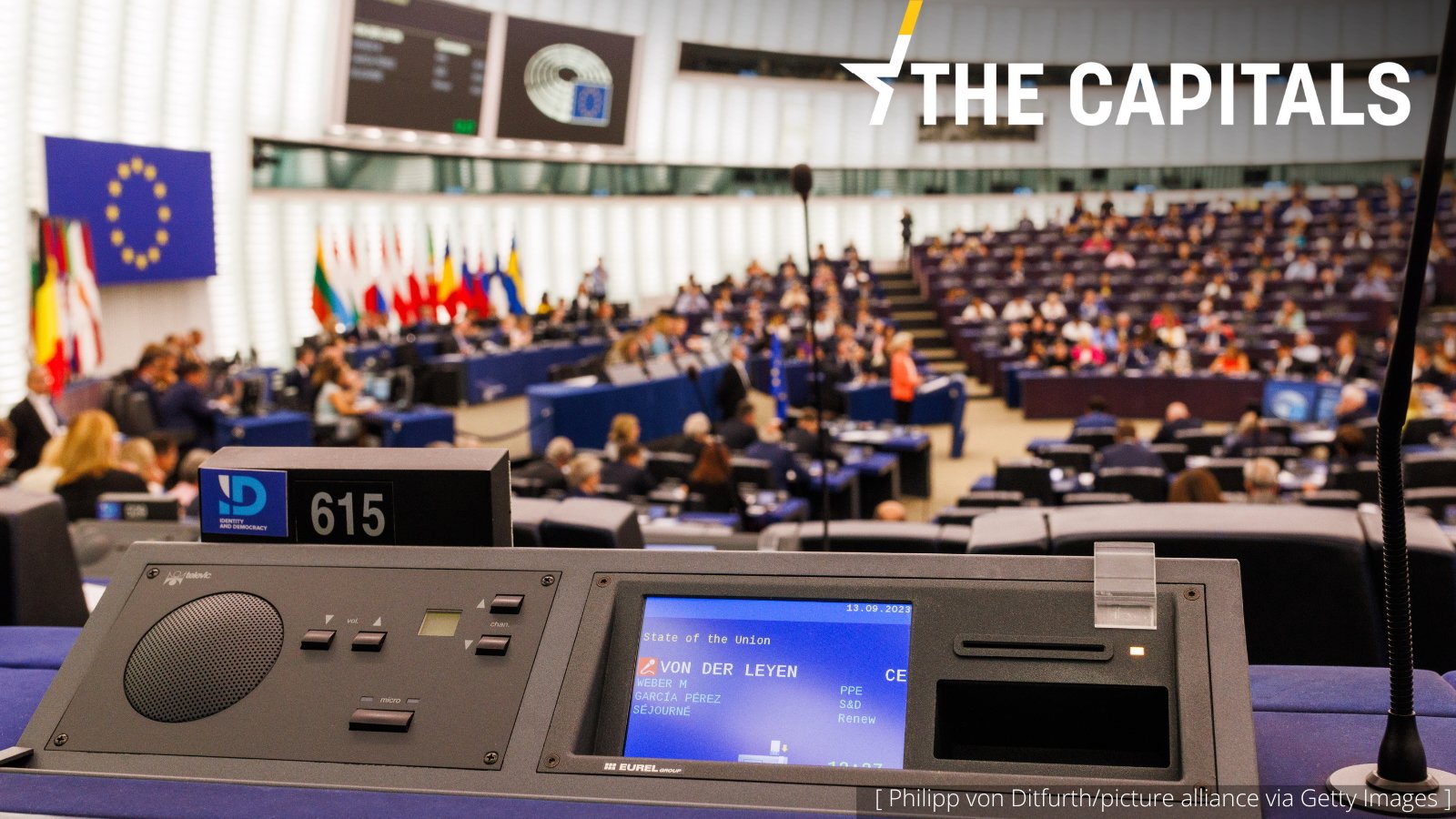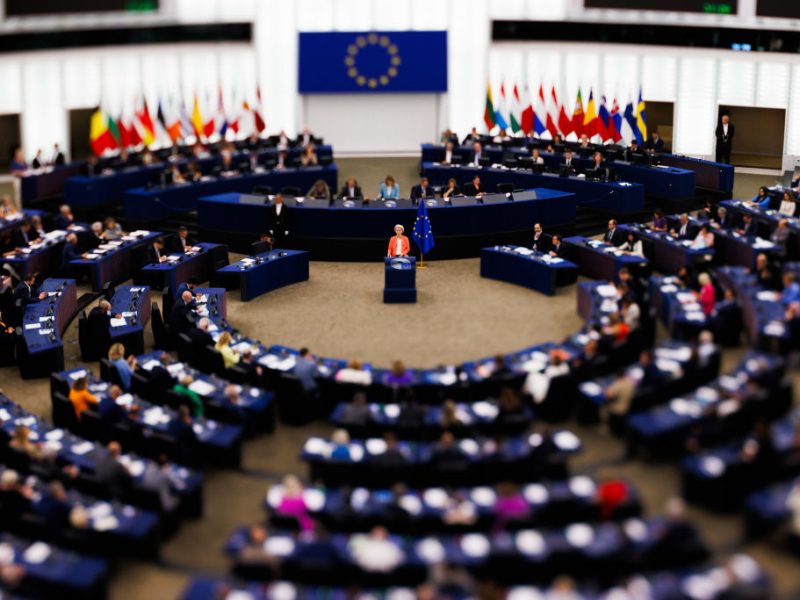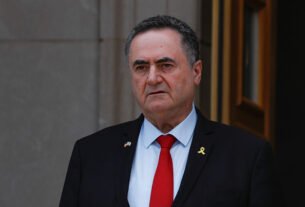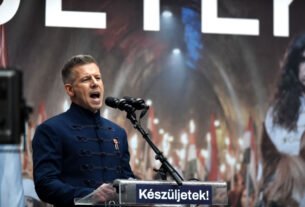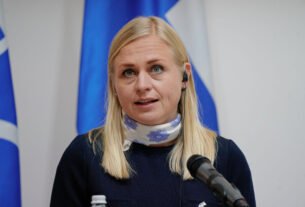It’s Wednesday. This is Eddy Wax, with Nicoletta Ionta – who is reporting from Strasbourg this week along with Magnus Lund Nielsen and Sofía Sanchez Manzanaro. If you’re there, say hello.
RIP The Capitals. This is the final ever edition under our current name. Tomorrow, we relaunch under a brand-new identity – and you’ll read it here first. Forward this to a friend or colleague to spread the good news.
Need-to-knows:
- Parliament: Ursula von der Leyen delivers her State of the Union speech at 9 a.m. Follow our live blog
- Poland: Military shoots down drones in its airspace for the first time in the Ukraine war
- Portugal: António Costa calls for Lisbon’s mayor resignation after funicular crash
Today’s edition is powered by the European Commission
Big breakthroughs begin with bold ideas. Join us at the European Research and Innovation Days 2025 with Commissioner Ekaterina Zaharieva on 16 and 17 September for two days of debate, live testimonials and forward-looking sessions on the future of European competitiveness and resilience. Be part of shaping EU policy!
Register now.
In the capital
The state of the European Union could probably best be described in one rude word.
And yet Ursula von der Leyen is in Strasbourg today, clutching a 69-page pamphlet called “From Promise to Progress,” determined to tell MEPs in her annual address that the European project is not only alive but also capable of thriving in an ever more hostile world.
The timing could hardly be worse. France has just installed its fifth prime minister in two years. Spain and the Netherlands are wobbling. Slovakia and Hungary continue to wield their vetoes on Russia policy. Populist Andrej Babiš is poised for a comeback in Czechia. And on both sides of the Atlantic, Europe bows to Donald Trump – “Daddy” in trade and security alike.
Commission officials may bill the speech as a “milestone for European democracy,” but for many lawmakers it feels more like a reckoning. This could be the first grand slam occasion for MEPs to vent their frustration at the EU’s deal with Washington, and a crucial test of von der Leyen’s defence of it. Her mantra – that worse was possible, that 15% tariffs are tolerable – convinces few.
Israel’s war in Gaza looms large. Left-leaning MEPs want Parliament to use the word “genocide” for the first time, accusing von der Leyen of deafness to Palestinian suffering. Protesting lawmakers dressed in red are expected outside the hemicycle this morning.
Yesterday’s strikes on Hamas in Qatar will likely add more pressure on von der Leyen to show the plenary that the EU is doing something to pressure Benjamin Netanyahu, beyond a blocked proposal to bar Israeli companies from the bloc’s research program.
Even Germany and Italy – once Israel’s staunchest European defenders – condemned the actions, a striking reversal from when Friedrich Merz framed earlier attacks on Iran as Israel carrying out Europe’s “dirty work.”
Whatever the speech contains, it won’t silence talk of censure. The Left is only a few signatures short of the 72 needed to trigger yet another vote to topple the Commission, with even Irish Socialist Aodhán Ó Ríordáin breaking ranks from the supposedly pro-Commission coalition.
Still, there are gestures toward Parliament. As we were first to report on Tuesday, the two institutions struck a deal giving MEPs more powers to summon commissioners and might limit the Commission’s ability to bypass them by claiming emergencies.
This rejigging of the balance of power is hardly a radical power-grab, but as von der Leyen steps into the lion’s den, it amounts to an olive branch – or at least a twig – from a Commission president long accused of dismissing Parliament’s role.
In her last annual address, in 2023, von der Leyen famously greeted MEPs, in a Freudian slip, as “honourable member states” – as if to reveal where she believed authority truly lay. The question now is whether her latest words will erase that memory or etch it deeper.
Warsaw’s first takedown in its own skies
Poland said early Wednesday its forces shot down drones in its airspace during Russian strikes on western Ukraine – the first time Warsaw has engaged targets over its own territory since the war began.
NATO assets joined the operation, residents in several provinces were told to shelter at home, and Polish troops are searching for wreckage.
The incident comes as Poland prepares to close its border with Belarus on Thursday night, ahead of Russia and Minsk’s “Zapad” war games nearby that will simulate attacks on the Suwałki Gap, while NATO holds parallel “Iron Defender-25” exercises inside Poland.
US Senator Dick Durbin said the incursions showed Russian President Vladimir Putin was “testing our resolve to protect Poland and the Baltic nations.”
Costa steps into Lisbon crash debate
António Costa has raised eyebrows by wading into a Portuguese political row over who is to blame for the Glória funicular crash that killed 16 people in Lisbon. The European Council president spent nine years as prime minister and led the socialist party for a decade.
Lisbon’s centre-right mayor, Carlos Moedas, defended himself by pointing to former Socialist leader Jorge Coelho, whom he accused of ignoring warnings before a 2001 bridge collapse. He insisted he had received no such warnings prior to the funicular disaster.
Costa and other ex-ministers that served alongside Coelho, who died in 2021, accused the mayor of peddling “falsehoods” in a joint letter to “defend his memory.” The letter also had the effect of piling pressure on Moedas, a former European commissioner.
It’s not Costa’s first intervention into a national debate since taking on his EU role; he has even aimed veiled criticism at his own party leadership. But his latest move comes at a sensitive moment: he is touring European capitals to meet leaders while Lisbon gears up for an October election. Moedas is on the ballot, facing a Socialist challenger. Costa is yet to stop in Lisbon, but clearly, he doesn’t need to be there to make his presence felt.
Lukoil in the crosshairs of next sanctions package
France and Germany want the EU to widen sanctions on Russia by targeting major oil producers and third countries that keep Moscow’s oil flowing around the world, according to a position paper seen by The Capitals.
Paris and Berlin argue that the package should target major Russian energy players to rip into Moscow’s ability to raise funds for its war. “Additional steps should be considered, in particular listing oil majors such as Lukoil or Litasco, in order to put maximum pressure on Moscow’s capacity to export its oil,” the document states.
Lukoil, Russia’s second-largest oil company after Rosneft, has so far not yet been placed on the EU blacklist, mostly due to the dependence of some EU countries, such as Hungary and Slovakia, on its energy supplies.
Orbán presses the EU for border money
Viktor Orbán has called on Brussels to provide financial support for Hungary’s border-protection measures, in a letter to von der Leyen obtained by Euractiv and circulated to EU governments.
“I have read with interest your statement made in Poland, that the physical barriers protecting the external borders of the European Union is a shared responsibility,” Orbán wrote.
Hungary, he said “has recurrently requested the reimbursement of these expenses from the European Commission. However, instead of receiving political or financial support, Hungary only met continuous criticism and is condemned to paying an unprecedented daily financial penalty of 1 million euros.” Orbán concluded with a demand for money to frontline states.
Lawmakers accidentally back Ukraine critique
MEPs on Tuesday accidentally backed an amendment condemning the EU’s “militaristic strategy” in Ukraine, Magnus Lund Nielsen reports. Confusion broke out when Parliament President Roberta Metsola, who chaired the session, called a vote on a different amendment than expected.
Even Michael Gahler, the lawmaker in charge of the Ukraine report, instructed colleagues to support the amendment by German Left lawmaker Özlem Demirel. Demirel’s text – which passed with 365 votes in favour and 182 against – argues that Brussels’ approach has “failed to secure peace and undermined the EU’s global relevance,” and calls for an urgent pivot toward diplomacy and civilian protection.
Parliament’s press service admitted “there was a mistake,” and pointed to voting corrections. Metsola’s office declined to comment. By evening, 130 MEPs had filed corrections, but the amendment will remain in Parliament’s official position on Ukraine’s EU integration, even though the text itself is not legally binding.
Copenhagen’s climate climax
Denmark is pushing for an eleventh-hour win on the EU’s 2040 climate target, Nikolaus J. Kurmayer writes.
A draft law obtained by Euractiv shows Copenhagen, currently chairing negotiations, offering major concessions to bring on board holdouts such as Paris and Warsaw. Among them: a review of the 90% emissions-cut target if it proves too heavy a burden for European industry and opening debate on significant outsourcing climate action to third countries.
The country hopes to secure consensus at a ministers’ meeting on 18 September, ensuring the bloc can present a unified 90% target at the upcoming UN climate conference, COP30, in Brazil.
The capitals
BERLIN
Merz kicked off Germany’s top car fair pleading for EU rules that don’t smother carmakers, calling for “smart, reliable, flexible” regulation. He didn’t name the incoming sales ban on new autos with internal-combustion engines, but the message to von der Leyen ahead of her industry huddle on Friday was clear.
PARIS
After a season of impeachments comes the blockades: France enters a fresh cycle of protests today with the first round of “Let’s Block Everything” demonstrations against austerity. Hundreds of actions are planned nationwide, targeting infrastructure from ring roads and refineries to universities and airports. The government has mobilised 80,000 police, fearing unrest from a movement backed by the far left. French intelligence estimates that around 100,000 could take part, with a general strike looming on 18 September.
MADRID
Spain’s Supreme Court has ordered AG Álvaro García Ortiz to stand trial for allegedly leaking judicial secrets, imposing €150,000 bail. He could face up to six years in prison in a case linked to Popular Party leader Isabel Díaz Ayuso. The court declined to suspend him from office, prompting socialist PM Pedro Sánchez’s government to express support while the opposition decried “institutional degradation.”
PRAGUE
In a gesture of defiance, Czechia has begun sending 170 tonnes of illegally dumped waste from the village of Jiříkov back across the border to Germany after tense talks with Bavarian authorities. The environment minister called it organised crime, noting the director of the company behind the dumping has been arrested and stressing the country would not serve as Europe’s dumping ground.
LISBON
PM Luis Montenegro asked Chinese President Xi Jinping to nudge Russia toward peace in Ukraine during an official visit to Beijing. He said he delivered the message “frankly and directly,” framing it as an appeal from a friendly partner.
BRUSSELS
US Secretary of Homeland Security Kristi Noem is in town for a series of bilateral meetings. Local media reported that she visited the port of Antwerp, a notorious entry point for drugs into Europe.
BRATISLAVA
Slovakia’s government proposed €2.7 billion in budget cuts to stabilise its public finances, including cutting three public holidays, freezing pension benefits and raising taxes. Finance Minister Ladislav Kamenický said the holiday on 17 November that commemorates the fall of communism would be scrapped permanently, while Epiphany on 6 January and Victory Day on 8 May would be suspended. Opposition parties criticised the plan as harmful to economic growth.
Also on Euractiv
SAFE money, big winner: Poland could walk away with €43.7 billion – almost a third of the EU’s €150 billion defence loans package, according to the Commission’s tentative breakdown.
That’s more than twice Romania’s share, the next biggest allocation, with France, Hungary and Italy trailing. Expect bruised egos and frantic lobbying as capitals race to finalise plans ahead of the November cut-off.
The EU’s problem isn’t just underinvestment – it’s self-doubt, write European Policy Centre’s Philipp Lausberg and Georg Riekeles in an op-ed for Euractiv.
With trillions in savings leaking abroad, they urge von der Leyen to unleash the bloc’s Sovereignty Instrument, harness Norway’s sovereign fund, and prod the ECB into backing EU securities. The message: Europe must stop hesitating and start investing.
Agenda
Von der Leyen delivers her annual State of the Union speech in Strasbourg
Parliament plenary debates mass migration, the EU–US trade deal, the 2026 budget, traveller protections, satellite interference in transport, the rule of law in Slovakia, digital taxation, and human rights issues in Cyprus, Rwanda and Togo
Costa visits Hungary and Germany.
Defence ministers of France, Poland, Germany, the UK, and Italy meet in London
Ambassadors meet in Coreper I and II in Brussels
Contributors: Magnus Lund Nielsen, Nick Alipour, Natália Silenská, Aleksandra Krzysztoszek, Pedro Morais Fonseca, Inés Fernández-Pontes, Nikolaus J. Kurmayer, Thomas Møller-Nielsen, Sara Madeira
Editors: Christina Zhao, Sofia Mandilara

